Ski holiday tracker: The latest Covid rules in ski resort and travel advice
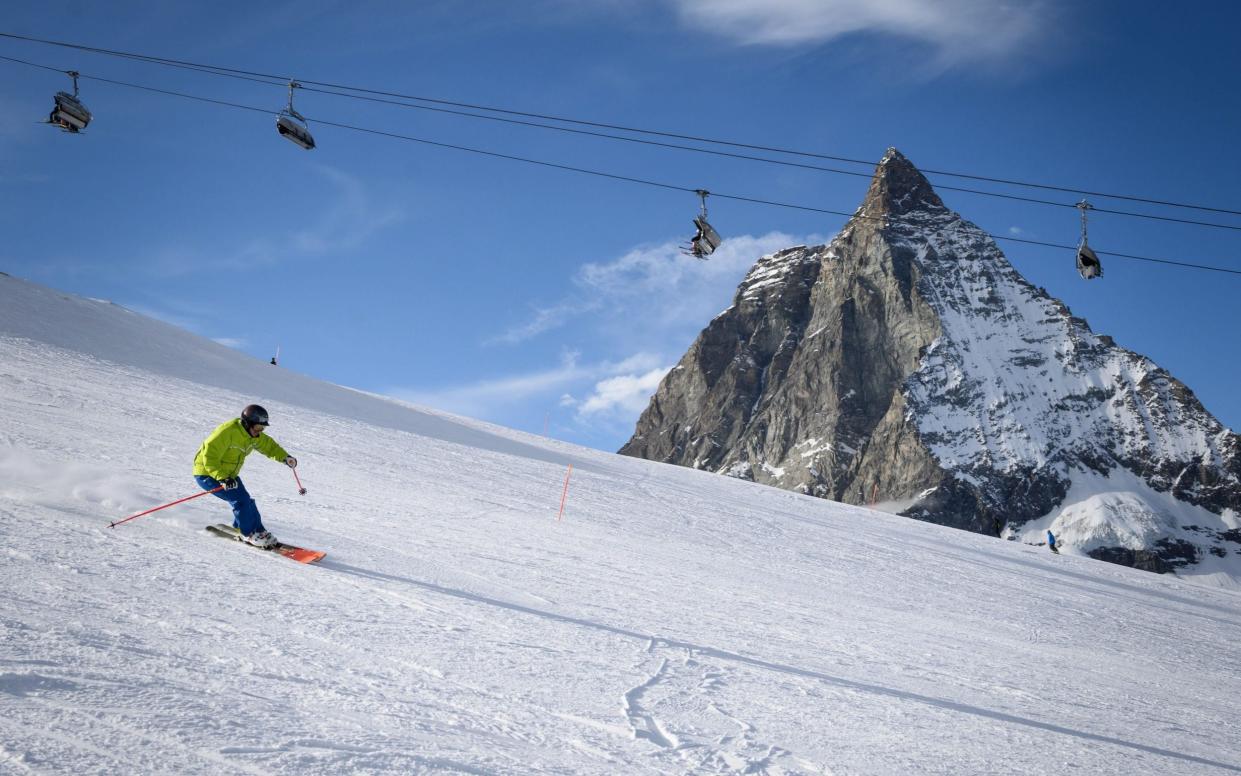
The 2021/22 ski season is almost upon us and after two winters’ worth of disruption, closed resorts and cancelled holidays British skiers are more eager than ever to return to the slopes.
Whether ski holidays will be able to go ahead without a glitch this winter is the million-pound question for every skier and snowboarder, but following the removal of the Government's travel traffic light system, easing of testing requirements for double-jabbed travellers and with resorts ready and raring to welcome Britons back, it looks like the race to the slopes is on.
With that in mind, we’ve put together a guide to help you navigate the uncertainties and maximise your chances of getting away to the best ski holiday destinations during the 2021/22 winter, with details of all the rules and regulations you can expect in resorts.
As is the status quo in the world of post-pandemic travel, holidaymakers will need to be flexible, take the right precautions and plan carefully – but that doesn't mean it isn't worth booking now.
Switzerland
Entry requirements
Vaccinated British travellers are allowed to visit Switzerland. All arrivals must have proof of vaccination, recovery from Covid-19 in the last six months or a negative test taken prior to departure. Non-vaccinated travellers must meet a list of specific criteria, not including holidays, in order to be permitted entry. Unvaccinated children under the age of 18 are allowed to enter in the company of a fully-vaccinated adult. All arrivals must fill out a passenger locator form and report their arrival to the cantonal authority within two days. Find more information here.
Are resorts open?
Yes. Switzerland was the only major Alpine nation to open its slopes to non-residents last winter – in doing so it proved ski holidays can operate safely in the post-pandemic age. Resorts with high-altitude glaciers, such as Zermatt and Saas Fee are already open for skiing and the rest are due to follow suit in the coming weeks. Our reporter was on the slopes of Andermatt for its open, here's what you can expect from Swiss ski holidays this winter.
What rules are in place?
In order to stop the spread of the virus last winter, gondola capacity was reduced (but this will not be the case in 21/22), skiers were required to wear masks when in enclosed spaces and there were curbs on raucous apres ski – Verbier employed 'Covid angels' to make sure people are following the rules. Currently, as the new season approaches masks remain mandatory in indoor queues and cable cars and across Switzerland entry to many indoor venues, such as restaurants or bars, is only permitted to those who have been fully vaccinated, recovered from coronavirus, or tested negative, and have a certificate to prove it. Find out what the rules are vaccinations in ski resorts this winter here. Switzerland’s tourism industry has also introduced a ‘Clean & Safe’ stamp that has been adopted by hotels, restaurants and transport providers, among others, to show a commitment to Covid-19 health and safety guidelines.
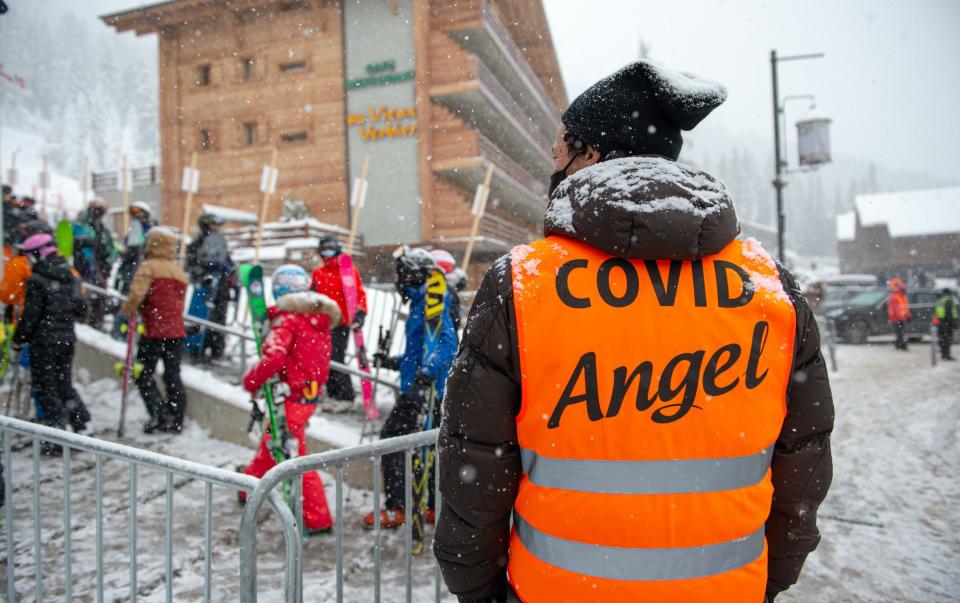
Austria
Entry requirements
Austria is open to British skiers and snowboarders, but in order to avoid having to quarantine on arrival, you must have had your second vaccine, or booster, no more than 360 days ago and now less than 21 days before travel. From December 6, the validity of two-dose vaccinations, such as those given in the UK, will be reduced to 270 days (nine months). Arrivals must complete a pre-travel clearance form before entering Austria. Anyone who is not double jabbed is permitted entry with proof of a negative test or recovery from Covid-19, but they must enter quarantine for 10 days, with the option to end isolation after 5 days with a new negative PCR test result. Children do not have to isolate if they are travelling with a fully vaccinated adult. Find more information here.
Are resorts open?
Yes and in fact a number of high-altitude Austrian resorts have opened early due to favourable snow conditions on their glaciers. The resort of Sölden, in the Otztal valley, opened the slopes on the Rettenbach glacier on September 10, three weeks ahead of schedule. Following suit, lifts on the Pitztal glacier, also in the Tirol, began turning on September 18, a week earlier than planned. Kitzbuhel began to open its slopes on October 11. Last winter, resorts in Austria did open, eventually, but only to local residents.
What rules are in place?
Several rules were in place to stop the spread of the virus last winter and many will remain this season, including mandatory FFP2 face masks in designated areas, including enclosed lifts. From November 15 Austrian resorts will also require all skiers to be fully vaccinated or show proof of recovery (a negative Covid-19 test will no longer be accepted) to access the likes of cable cars, and subsequently the slopes, as well as bars and restaurants around the resort – the 2G rules is likely to remain until the New Year as the country battles with rising cases – children under the age of 12 are exempt and discussions are ongoing on how this impacts teenagers. From December 6 there will be further changes, to comply with the '2G' rule, two-dose vaccinations, such as those administrated in the UK, will only be considered valid for nine months after the second dose. More information can be found here. Apres ski looks set to be significantly muted too, it too will be limited to fully vaccinated visitors or those with proof of prior infection. Last winter as restrictions tightened, anybody wanting to use the slopes was required to provide evidence of a negative test, taking 72 hours beforehand – there were patrols on the pistes to ensure compliance.
France
Entry requirements
Fully vaccinated Britons are allowed to visit France restrictions free, however must produce a sworn statement of no symptoms and download a health pass for access to public places. Children aged 12 years old or over who are not fully vaccinated and travelling with a double-jabbed adult are required to present a negative test result in order to avoid quarantine. Find more information here.
Are resorts open?
Yes, but mainly at high altitudes, including the glacier in Tignes, which opened on October 16 for the winter. A number of resorts, including Les Deux Alpes and Tignes opened successfully for snow sports over the summer on their glaciers too. The most snow-sure resorts hope to open by the end of November, including Val d’Isere and Val Thorens. Last season ski lifts in France did not turn at all, the resorts were only open to ski touring and for other activities that didn’t require lift access – many are hopeful it will be a different scenario in 21/22.
What rules are in place?
Across France, since August, it has been a legal requirement to show a pass sanitaire or NHS vaccination certificate to enter all restaurants, cafés and bars – even to sit outside. For the over 65s, the third booster dose will be mandatory to activate the pass from December 15. Visitors may also be asked to wear your mask unless seated at a table. The pass sanitaire will not be compulsory to access ski lifts this winter, unless the national case rate surpasses 200 per 100,000, officials have confirmed. Masks will be mandatory on lifts and when queues, but not on the slopes. Some restaurants and bars might decided to impose capacity limits to help implement rules and curb any outbreaks.
Italy
Entry requirements
Italy's borders are open to British holidaymakers, and vaccinated visitors no longer have to quarantine. Those who haven't had both jabs do still have to quarantine for five days, at the end of which they must take a test. Everyone, regardless of vaccination status, must present a negative test taken in the 48 hours before entering Italy and complete the EU’s digital passenger locator form, via the EUdPLF application. Children under 18 do not need to quarantine if they are travelling with a fully vaccinated parent and (for those over the age of 6) have a negative test. Find more information here.
Are resorts open?
Yes. Following a winter of strict lockdowns and shuttered ski lifts, resorts in Italy have begun to reopen, namely those with glaciers for snow-sure autumn skiing – skiing is underway in Cervinia and Passo Stelvio. Major resorts, including Cortina d’Ampezzo, Livigno and Madonna di Campiglio, have opening dates penned for the end of November, all being well.
What rules are in place?
Across Italy masks are mandatory in all indoor public places, including shops and on public transport – in ski resorts this includes lifts. Currently in Cervinia, enclosed gondolas are running at 50 per cent capacity to encourage social distancing and Covid marshalls are on hand to ensure people are complying with rules. In restaurants and bars Italy’s ‘green pass’ is required for indoor dining or drinking – this will be extended as a requirement for anyone wanting to access ski lifts, and the slopes, this winter. Skiers are recommended to purchase lift passes online in advance to avoid queues and retain their lift pass card to use if visiting multiple times. As a general rule, lifts will operate at 80 per cent capacity and 'green passes' are not required for hotel stays.
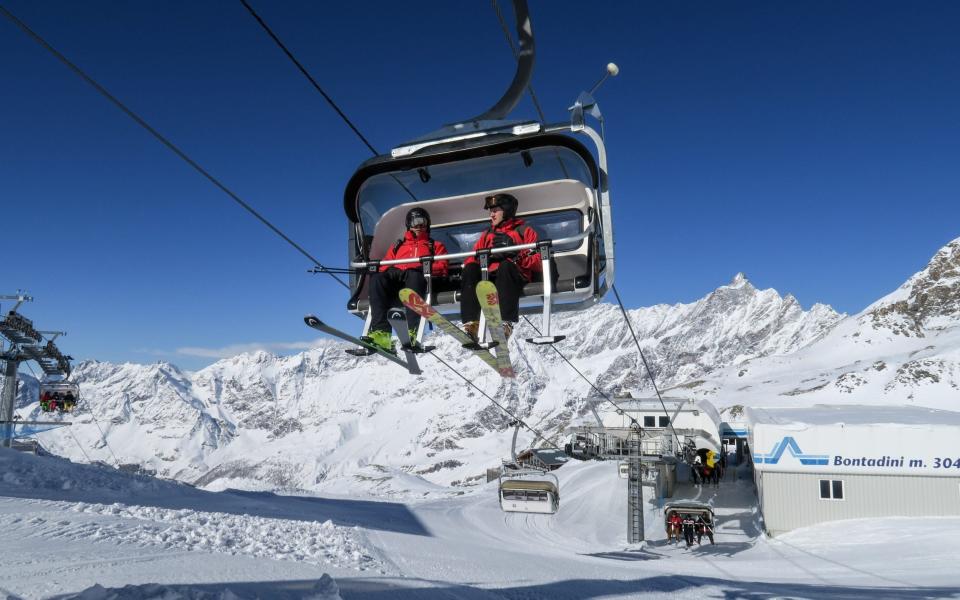
Canada
Entry requirements
Fully vaccinated travellers are welcome in Canada, however they must present proof of this plus a negative result of molecular test result taken no more than 72 hours before their scheduled flight. This information must be submitted via the ArriveCAN app before arrival, along with an electronic travel authorisation (eTA) form. Unvaccinated Britons are not eligible to enter Canada.
Are ski resorts open?
Not yet. From late November onwards the ski lifts in the likes of Banff, Lake Louise, Revelstoke and Whistler will start turning for the winter.
What rules are in place?
Canada’s resorts have been welcoming domestic visitors throughout the summer season and last winter, and are well versed in operating in the current climate, but rules vary greatly between resorts. In Whistler, the country’s largest and most popular resort, a number of measures have been announced by owners Vail Resorts to curb the spread of the virus this winter. These include mandatory mask wearing when indoors, but not on lifts, cashless transactions in shops and restaurants. Whistler Blackcomb requires proof of Covid-19 vaccinations in all indoor restaurants, restaurant patios and bars due to orders from the Provincial Health Authority of British Columbia and all Vail Resorts employees will be required to be vaccinated against Covid-19. Anyone wanting to eat at self-service restaurants on the mountain will need to make a mandatory reservation. Last winter the resort also adopted a reservation system for lift passes, requiring skiers to pre-book their place on the mountain each day – this has been scrapped for 2021/22 and lifts will run at their normal capacity. Elsewhere in British Columbia Grouse Mountain and Revelstoke have both mandated that skiers prove they’re vaccinated before visiting. Lake Louise in Alberta has implemented what is known as a 'Restrictions Exemption Program,' meaning skiers have to have proof of vaccination, a negative test or recovery to access most resort services.
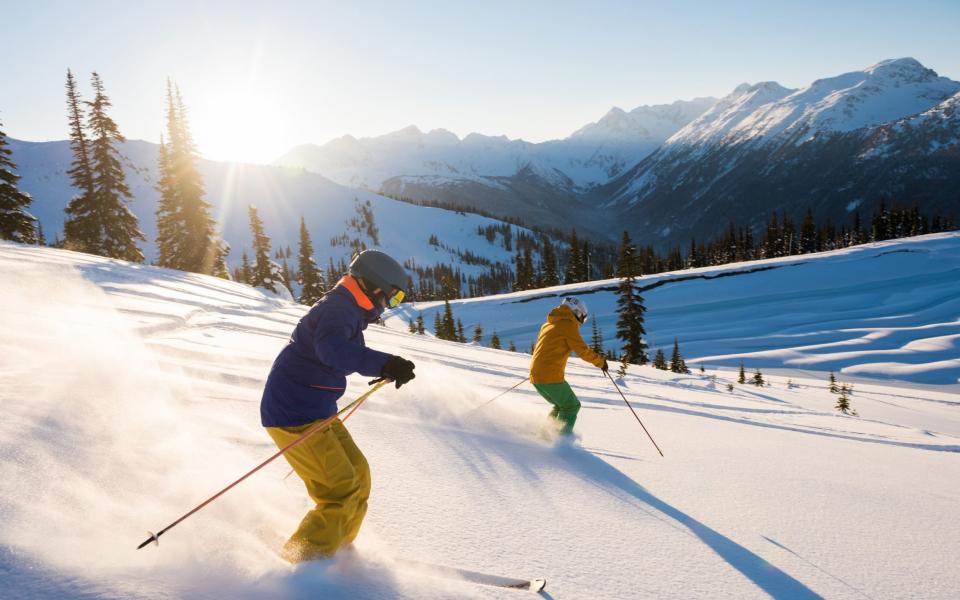
The US
Entry requirements
The travel ban between the UK and US has lifted. Fully vaccinated Britons, as well as unvaccinated under 18s, can travel to the US, with proof of a negative test, but not those who are unvaccinated. Find more information here.
Are ski resorts open?
Across the pond it's often a race to be the first resort to open for winter, with the likes of Arapahoe Basin keen to get lifts turning by mid/late-October. Arapahoe Basin won the race, opening on October 17, with the rest of Colorado's resorts preparing to open within the next month, including Vail and Aspen.
What rules are in place?
It’s a complicated situation in America, with varying rules from state to state. As a guide, a number of ski resorts are owned and operated by giant Vail Resorts, which implemented blanket restrictions across its destinations, regardless of state rulings, last winter. This season the mandatory lift pass reservation system has been scrapped, but masks remain commonplace and visitors aged 12 and over will be required to show proof of vaccination when eating at on-mountain self-service restaurants and all Vail Resorts employees will be required to be vaccinated against Covid-19. Ski school will also require proof of vaccination for full-day lessons. Elsewhere, at Aspen and Snowmass for example, similar rules apply, requiring vaccination to access restaurants and hotels, but not the slopes.
Norway
Entry requirements
Britons with a valid QR coded NHS Covid Pass do not need to provide evidence of a negative test on arrival in Norway, complete an entry registration form, test at the border or quarantine after arrival. Unvaccinated children are allowed to travel with their parents (if they’re double-jabbed) but must take a test upon arrival (children under 12 may be exempt). Unvaccinated travellers and persons who received their first vaccine dose between three and 15 weeks prior to their date of arrival must quarantine for three days, when they must test negative again.
Are ski resorts open?
Not yet. Norway’s ski resorts aim to open in mid-November, weather permitting.
What rules are in place?
Unlike their Alpine cousins Norway’s resorts have not made masks mandatory for visitors this winter. Instead visitors are encouraged to observe social distancing, stay at home if they feel unwell and make reservations in advance to avoid queues. It's one of a small handful of hassle-free ski holiday destinations this winter.
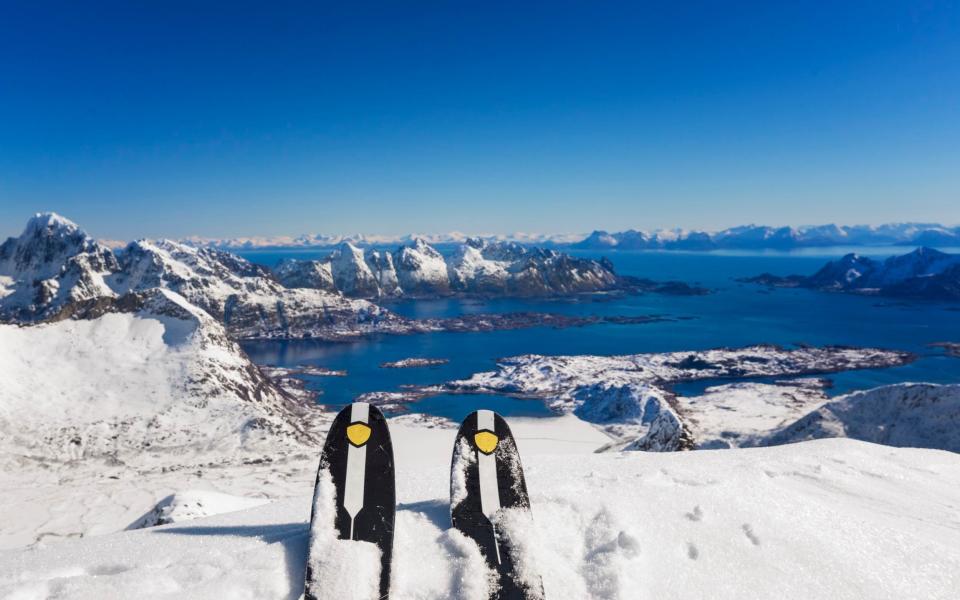
What do I need to know before I book the best ski holiday destinations for the 2021/22 season?
However positive things might look for the winter ahead it is essential you check the latest travel advice for a destination before booking.
Whether you leave it until the last minute or book now to secure your spot on the slopes, as long as you book with an Atol-bonded tour operator, or – in most cases – pay for your holiday with a credit card, you will get a refund in the event of the operator going into insolvency. Package holiday providers also have a legal responsibility for your safety, so they won’t take you to a destination that the FCDO advises against, and they are legally obliged to refund you for a cancellation – though many have been taking weeks or months to do so.
Many travel insurance companies have now started to sell policies again and nearly all will cover you if you get ill. Relatively few offer Covid-related cancellation cover though. Winter sport specialists MPI Brokers and Battleface have specific policies for snow-sport fans looking for extra cover, for coronavirus, ski-specific claims or travel against Foreign Office advice.
Before booking, you need to check explicitly the policy of the operator or airline you are dealing with and whether they will allow you to cancel without penalty if there is another lockdown or travel restrictions are tightened, impacting your ability to travel. Find everything you need to know before booking a ski holiday this winter here.


